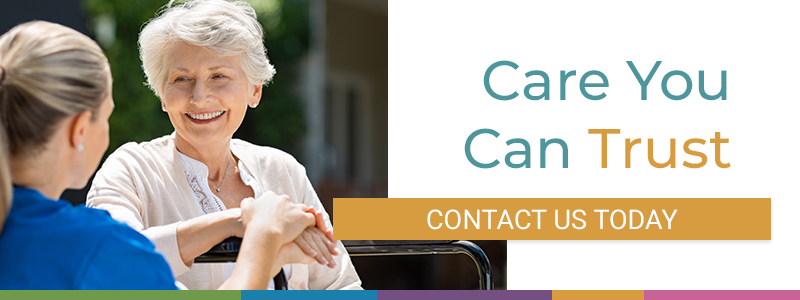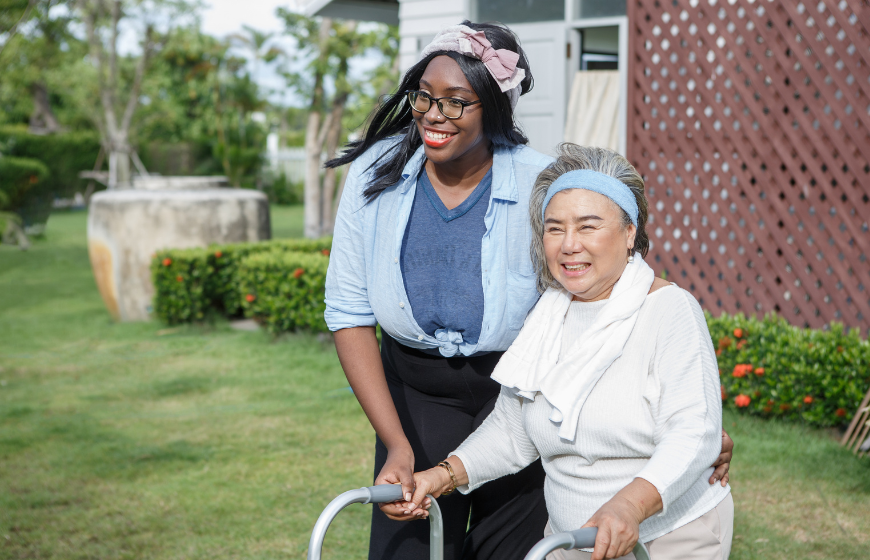Recovering from surgery can be just as stressful on the body as recovering from an illness or injury. Your recovery period should be a time of rest and relaxation, so you can focus on getting back on your feet. A patient’s condition can improve or worsen depending on how much they’re cared for after surgery.
Think about what you would like your postoperative, aka post-surgery, environment to look and feel like. Is it relaxed and familiar? Are loved ones able to easily drop by? Are you surrounded by personal comforts?
If so, a hospital or care facility may not be the ideal environment for you.
With constant nursing staff changes, irregular schedules, and loud emergencies going on in the background, your recuperation period may not be as peaceful as you would prefer if you choose to stay in a hospital. Instead, consider choosing to do your post-surgery care in your own home.
Read on to learn more about in-home postoperative care and how it could be beneficial for you.
What is Postoperative Care?
Postoperative care is the care and treatment that a patient receives after surgery. This will frequently include wound post surgical care and pain management. Naturally, the specific type of care you will receive depends on what kind of surgery you had, your medical history, and any complications after the surgery.1
Postoperative care can include:
- Cleaning and dressing wounds
- Taking pain medication to prevent infection, mitigate symptoms, and manage pain
- Maintaining feeding tubes, intravenous (IV) lines, and drains
- Drawing blood or taking other fluid samples
- Dealing with a postoperative complication
Postoperative care begins the moment your surgical procedure is completed and continues until you’re fully healed. It’s important to continue the process even after being discharged from the hospital because you will likely still be healing for weeks or even months after the procedure.
What is the Role of a Postoperative Nurse?
Many of the necessary tasks during your recovery period are difficult or uncomfortable to perform by yourself. Thus, postoperative nurses are there to help. The role of a postoperative nurse is to provide medical care and guidance throughout the recovery process. Their job can include:<2/span>
- Checking on your wounds – Postoperative nurses are trained to look for signs of proper healing and potential infection. These signs may not be obvious to non-medical professionals. It’s essential to ensure your wounds are kept clean and dry as they heal, so your nurse may also change your wound dressings.
- Checking on drains and IVs – After surgery, it’s important to monitor the patient’s fluid intake. Drains, IVs, feeding tubes, catheters, and other instruments left in place after surgery have to be properly maintained. In addition to ensuring they’re properly functioning, postoperative nurses will ensure they are kept clean and not causing unnecessary discomfort.
- Monitoring patient’s vital signs – Your vital signs, which include body temperature, pulse rate, oxygen saturation, and respiration rate, along with other important measures such as blood pressure and blood oxygen, are monitored after surgery. The nurse will also regularly check how you are feeling to regulate pain control. And when other parts of the body aren’t functioning properly by monitoring and testing them. For example, if you are having respiratory complications, a nurse will help you with respiratory exercises. More importantly, nursing interventions are crucial during emergencies. A postoperative nurse takes these measures to learn more about how your body is recuperating.
- Tracking medications – You may be prescribed nausea and pain medication along with antibiotics. It’s crucial to continue taking these medications as prescribed, and a postoperative nurse can help keep you on track.
- Educating family members – Often, parts of your care don’t necessarily require a nurse and can instead be performed by a family member or loved one. In that case, a nurse will teach them how to safely perform care tasks and tell them what signs of negative progression to look out for to prevent potential complication. That way, as you heal and require less intensive monitoring, more of your care can be handled by a loved one.
What are the Benefits of In-Home Post-Surgery Care?
Now that you’re familiar with the functions of post operative nursing care let’s explore the benefits of completing your recovery at home with the aid of a nurse.
#1 The Comforts of Home
Home sweet home is an expression for a reason. Your home is a safe, comfortable environment where you can fully relax. This is a stark contrast to a hospital environment, where your days and nights can be interrupted with unexpected check-ins, constant rotations of new caregivers, and emergencies.
At home, you’re surrounded by comfort and familiarity. Your personal care items and clean clothing are readily available. You can store fresh food that fits your personal taste preferences. Friends and family can easily visit with no restricted time frame. All of these factors and more combine to make your recovery experience much more enjoyable.
Additionally, it has been found that patients recover more quickly at home than they do in a hospital. Those who received home care had a rate of readmission to the hospital that was 70% lower than those stuck in hospital beds during their recovery. A large part of this change was attributed to movement, or the lack thereof. Patients who received care at home could walk around much more freely than those in a hospital setting.
#2 Help with Activities of Daily Living (ADLs)
Life at home after surgery can present some unexpected challenges. Even something as simple as getting out of bed can become a complicated task. A home care nurse is there to help you navigate many daily living activities that can be more difficult after surgery.4 These can include:
- Eating
- Walking
- Dressing
- Grooming
- Showering
- Transferring from standing to sitting or lying down
Even if you don’t anticipate having difficulty with these tasks, it’s important not to overexert yourself. A common cause of re-injury in surgery patients is trying to do too much, too fast.5 It’s not a sign of weakness to need help. Rather, it shows that you have respect and patience for your body’s healing process.
#3 Customized Care Plans
Your home care nurse is tasked with knowing everything about your surgery and medical needs. That way, they know exactly what you need to heal most effectively. A postoperative home care program will help you and your family develop a care plan that encompasses all aspects of your recovery.
Medication, wound care, diet, exercise, and mobility are all components of a care plan. A postoperative care nurse is qualified to help you with all of these areas. They can also help you learn how to eventually care for yourself and develop good habits to keep you safe and healthy after postoperative care.
#4 Closer Relationships
When you invite someone into your home to care for you, a much closer bond is formed than if you received care at a hospital. There is an added layer of trust inherent to at-home caregiving that helps facilitate a closer relationship between you and your nurse.
If you choose to work with an in-home postoperative care nurse, you will quickly find that your caregiver starts to feel like family. You can rest easy knowing that you’re being cared for by someone who thinks of you as a person, not just a patient.
#5 Care for Both Physical and Emotional Health
Care nurses are highly trained in handling both physical and emotional medical concerns. Despite the emphasis on relaxation, recovery can be a stressful time. Talking to someone who is both familiar with your medical situation and knowledgeable of how to handle mental health concerns is very valuable. Friends and family are often helpful in times of stress, but a medical professional can provide an additional unique point of view.
Having an all-in-one expert also limits the number of appointments you would have to go to per week. Rather than you going to multiple doctors, your nurse comes to you. Many postoperative nurses can also conduct specialized treatments such as physical and speech therapy to aid in recovery.
Why is Postoperative Care Important?
Often, people only think about everything leading up to their surgery. It’s easy to forget to plan for what comes after. The postoperative period can make or break the results of your procedure.
When your body is still recovering, careless mistakes can have costly consequences. In a less severe scenario, pushing yourself too hard soon after surgery can slow down your postoperative recovery. At worst, it could undo the progress that you achieved through surgery or cause a medical emergency.
If you want to be fully healed as soon as possible, and avoid additional invasive procedures, pay attention to your doctor’s recommendations for postoperative care. Taking your meds correctly, eating an appropriate amount, and balancing how much you move and rest are all essential parts of recovery. Postoperative nursing care can help you stay on top of your healing process.
Prioritize Your Healing with Alliance Homecare
Ensuring that you’re properly taken care of after surgery can be a heavy responsibility for your loved ones. Tackling everyday life on top of acting as a caregiver can be overwhelming, particularly for people who don’t have experience or training in patient care. Luckily, Alliance Homecare provides comprehensive at-home nursing care to help alleviate the stresses of recovery for both the postoperative patient and their loved ones.
Our team of nurses has extensive experience working with patients in recovery. In addition to post-surgical care, Alliance Homecare also specializes in in-home hospital care, chronic illness care, respite care, and hospice care.
If you or a loved one are recovering from surgery, trust Alliance Homecare to help guide you through recovery with compassion and ease.
Sources:
- Healthline. Postoperative Care. www.healthline.com/health/postoperative-care#in-the-hospital
- Medical University of South Carolina. Home Care After Surgery. www.muschealth.org/medical-services/ddc/patients/gi-surgery/home-care-after-surgery
- Healthline. Being Treated at Home Can Help People Save Money and Heal Faster. www.healthline.com/health-news/being-treated-at-home-can-help-people-save-money-and-heal-faster#70-percent-lower-readmission-rate
- Alliance Homecare. Caregiving Glossary. www.alliancehomecare.com/caregiving-glossary/
- WebMD. Mistakes After Surgery That Slow Your Recovery. www.webmd.com/healthy-aging/features/rehab-mistakes#1





